
Scherrie Ann Payne is an American singer. Payne is best known as a member and co-lead singer of the R&B/Soul vocal group The Supremes from 1973 until 1977. Because of her powerful voice and petite stature (5'2"), Payne is sometimes referred to as "the little lady with the big voice." Payne is the younger sister of singer Freda Payne. Payne continues to perform, both as a solo act and as a part of the "Former Ladies of the Supremes" (FLOS).

Shalamar is an American R&B and soul music vocal group active since the late 1970s and throughout the 1980s. Shalamar's classic line-up on the SOLAR label consisted of Howard Hewett, Jody Watley, and Jeffrey Daniel, together with dancer Jermaine Stewart. It was originally a disco-driven group created by Soul Train booking agent Dick Griffey and show creator and producer Don Cornelius. They went on to be an influential dance trio, masterminded by Cornelius. As noted in the British Hit Singles & Albums, they were regarded as fashion icons and trendsetters, and helped to introduce "body-popping" to the United Kingdom. Their name was created by Griffey.

Jody Vanessa Watley is an American singer whose music crosses genres including pop, R&B, jazz, dance and electronic soul. During the late 1970s and early 1980s she was a member of the R&B/funk band Shalamar, who scored many hits, notably so in the UK. In 1988, she won the Grammy Award for Best New Artist and has been nominated for three Grammy awards.
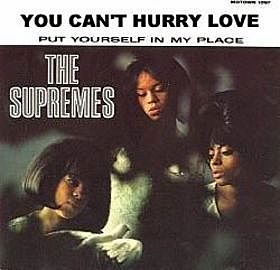
"You Can't Hurry Love" is a 1966 song originally recorded by the Supremes on the Motown label. It was released on July 25 of 1966 as the second single from their studio album The Supremes A' Go-Go (1966).
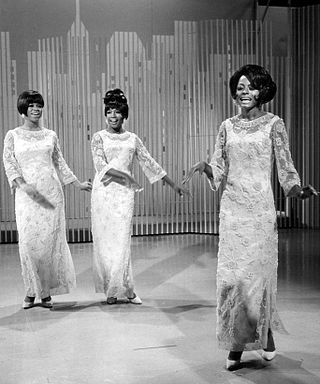
American girl group The Supremes have released 29 studio albums, four live albums, two soundtrack albums, 32 compilation albums, four box sets, 66 singles and three promotional singles. The Supremes are the most successful American group of all time, and the 26th greatest artist of all time on the US Billboard charts; with 12 number-one songs on the Billboard Hot 100 and three number-one albums on the Billboard 200. The Supremes were the first artist to accumulate five consecutive number-one singles on the US Hot 100 and the first female group to top the Billboard 200 albums chart with The Supremes A' Go-Go (1966). In 2017, Billboard ranked The Supremes as the number-one girl group of all time, publishing, 'although there have been many girl group smashes in the decades since the Supremes ruled the Billboard charts, no collective has yet to challenge their, for lack of a better word, supremacy.' In 2019, the UK Official Charts Company placed 7 Supremes songs—"You Can't Hurry Love" (16), "Baby Love" (23), "Stop! In the Name of Love" (56), "Where Did Our Love Go?" (59), "You Keep Me Hangin' On" (78), "Come See About Me" (94) and "Stoned Love" (99)—on The Official Top 100 Motown songs of the Millennium chart, which ranks Motown releases by their all-time UK downloads and streams.
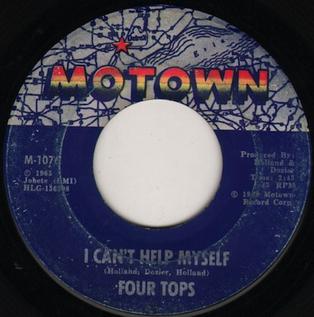
"I Can't Help Myself (Sugar Pie Honey Bunch)" is a 1965 hit song recorded by the Four Tops for the Motown label.
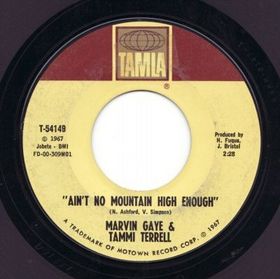
"Ain't No Mountain High Enough" is a song written by Nickolas Ashford & Valerie Simpson in 1966 for the Tamla label, a division of Motown. The composition was first successful as a 1967 hit single recorded by Marvin Gaye and Tammi Terrell, and became a hit again in 1970 when recorded by former Supremes frontwoman Diana Ross. The song became Ross's first solo number-one hit on the Billboard Hot 100 chart and was nominated for the Grammy Award for Best Female Pop Vocal Performance.

"I Want You" is a song written by songwriters Leon Ware and Arthur "T-Boy" Ross and performed by singer Marvin Gaye. It was released as a single in 1976 on his fourteenth studio album of the same name on the Tamla label. The song introduced a change in musical styles for Gaye, who before then had been recording songs with a funk edge. Songs such as this gave him a disco audience thanks to Ware, who produced the song alongside Gaye.

"Never Can Say Goodbye" is a song written by Clifton Davis and originally recorded by the Jackson 5. The song was originally written and intended for the Supremes; however, Motown decided it would be better for the Jackson 5. It was the first single released from the group's 1971 album Maybe Tomorrow, and was one of the group's most successful records. It has been covered numerous times, most notably in 1974 by Gloria Gaynor and in 1987 by British pop group The Communards.
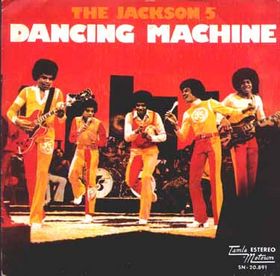
"Dancing Machine" is a song recorded by American R&B group the Jackson 5; it was the title track of their ninth studio album. The song was originally recorded for the group's 1973 album G.I.T.: Get It Together and was released as a remix.

"Where Do Broken Hearts Go" is a song recorded by American singer Whitney Houston for her second studio album, Whitney (1987). It was released as the fourth single from the album on February 25, 1988. The song was written by Frank Wildhorn and Chuck Jackson and produced by Narada Michael Walden. A pop ballad set in the key of D major, the record is about someone seeking for a former lover to return after a breakup. Upon its release, the song received mixed reviews from critics.

"Ooo Baby Baby" is a song written by Smokey Robinson and Pete Moore. It is a classic 1965 hit single by The Miracles for the Tamla (Motown) label. The song has inspired numerous other cover versions by other artists over the years, including covers by Ella Fitzgerald, Todd Rundgren, The Escorts, The Five Stairsteps, Linda Ronstadt, and many others. The Miracles' original version of "Ooo Baby Baby" is listed as number 266 on Rolling Stone Magazine's list of "The 500 Greatest Songs of All Time".

"Love Is Here and Now You're Gone" is a 1967 song recorded by the Supremes for the Motown label.

"Piece of My Heart" is a romantic soul song written by Jerry Ragovoy and Bert Berns, originally recorded by Erma Franklin in 1967. Franklin's single peaked in December 1967 at number 10 on the Billboard Hot Rhythm & Blues Singles chart in the United States.

"Forever Came Today" is a 1968 song written and produced by the Motown collective of Holland–Dozier–Holland, and was first made into a hit as a single for Diana Ross & the Supremes in early 1968. A disco version of the song was released as a single seven years later by Motown group the Jackson 5.

"You've Made Me So Very Happy" is a song written by Brenda Holloway, Patrice Holloway, Frank Wilson and Berry Gordy, and was released first as a single in 1967 by Brenda Holloway on the Tamla label. The song was later a huge hit for jazz-rock band Blood, Sweat & Tears in 1969, and became a Gold record.

"The Second Time Around" is a 1979 hit by Los Angeles-based group Shalamar. The song is the first single from their album, Big Fun. Released in August 1979, the single went to number one on the soul chart and was their most successful hit on the Hot 100 pop chart, reaching number eight in early 1980. "The Second Time Around" also went to number one on the disco/dance chart in January 1980. The song was produced by Leon Sylvers III, who cowrote the song with William Shelby.

"And the Beat Goes On" is a 1979 single by the American music group the Whispers. The song was their first of two number-one singles on the Soul chart, and their first Top 20 hit on the Billboard Hot 100, peaking at number 19. "And the Beat Goes On" was the group's only number-one song on the dance chart. It was also their first and biggest hit in the United Kingdom, peaking at number 2 on the UK Singles Chart. The song also peaked at number 27 on the Canadian RPM chart.

"The Best Disco in Town" is a 1976 crossover disco single by Philadelphia-based group, The Ritchie Family. In the United States, the single was a top 20 hit on both the soul and pop charts. "The Best Disco in Town" went to number one for one week on the disco/dance chart.

Uptown Festival is the first album credited to American R&B group Shalamar, released in 1977 on the Soul Train label. The album was in fact recorded by session singers. It peaked at #22 on the US R&B chart and #48 on the Billboard Albums chart.




















